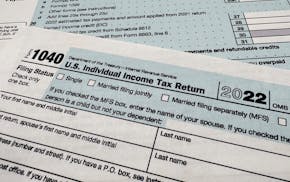Hours after the U.S. Supreme Court's decision siding with a Christian graphic artist who doesn't want to make wedding websites for gay couples in Colorado, organizations advocating for and against same-sex marriage were parsing out the ruling's impact in Minnesota.
The high court's decision only addresses "expressive or creative enterprise, which is a fairly narrow category of businesses," said Kat Rohn, executive director of LGBTQ advocacy organization OutFront Minnesota. That means web designers, and other businesses that do creative expressions for customers.
"This is not a broad license to discriminate or to undermine the longstanding non-discrimination protections we have in Minnesota," Rohn said. The decision didn't specify businesses or products, beyond the Colorado designer, making further legal challenges likely.
Similar to Colorado, where the case before the high court originated, Minnesota law says it is an unfair discriminatory practice to "deny any person the full and equal enjoyment of the goods, services, facilities, privileges, advantages, and accommodations of a place of public accommodation" for a host of reasons including sexual orientation.
It was unclear just how far the Supreme Court's ruling will reach.
"How many public accommodations does it apply to?" asked Jess Braverman, legal director of Gender Justice, a St. Paul nonprofit law and policy organization that takes up civil rights cases involving gender and sexuality. "What … services does a business have to provide in order to fall under the exception … and that is still up for debate, but at the very least it would have to be some sort of artistic or creative or custom-made service."
The decision comes after the state faced a similar lawsuit several years ago. A St. Cloud husband-and-wife film company challenged the constitutionality of the Minnesota Human Rights Act in 2016, arguing that they would be punished for refusing to film the wedding ceremonies of same-sex couples.
After the couple, Carl and Angel Larsen, won at the Eighth U.S. Circuit Court of Appeals, their case was remanded to the district court, which issued a preliminary injunction protecting the plaintiffs from the law while the suit proceeded. But that case ended in 2021, when the court granted the Larsens' motion to dismiss the case after the couple said they were exploring new opportunities outside the wedding field due to a downturn in business amid the pandemic.
Minnesota Department of Human Rights Commissioner Rebecca Lucero issued a statement Friday saying her agency affirms that freedom from discrimination is a civil right, and the department will determine how to uphold that in the weeks and months ahead.
"In Minnesota, we are not in the business of creating second-class community members. That principle is as true today as it was yesterday," Lucero's statement said.
Braverman said future court cases will decide "the full scope" of the Supreme Court ruling, but "the Minnesota Human Rights Act continues to protect LGBTQ people from discrimination and we will continue to make sure that it's enforced."
She said she doesn't think there are "that many businesses who want to discriminate against their customers based on who they are. That being said, I think businesses will have to be cautious. The ruling does not give free rein to discriminate."
For example, she said, if you own a drugstore, you can't turn away customers because of who they are. The majority opinion says as much, calling it "pure fiction" that the dissenting opinion suggests the ruling is akin to endorsing a "separate but equal" regime that would allow restaurants to deny service to Black Americans and similar actions.
The decision drew praise from Jonathan Scruggs, vice president of litigation strategy and the Center for Conscience Initiatives with Alliance Defending Freedom, the Christian legal nonprofit that backed the Larsens' case in St. Cloud.
The ruling "rightly reaffirmed that the government can't force Americans to say things they don't believe. This is a win for all Americans," he said in an email. "The government should no more censor [the graphic artist] for speaking consistent with her beliefs about marriage than it should punish an LGBT artist for declining to criticize same-sex marriage. If we desire freedom for ourselves, we must defend it for others."

Charges: Minneapolis man, out-of-state cohort filed more than 100 false tax claims totaling $3M

Walz weighs in on canceled Minnesota cannabis license lottery: Litigation 'happens in every state'

Gov. Tim Walz calls for tougher Medicaid fraud penalties as FBI investigates autism centers

Minnesota abandons early cannabis lottery, retail pot sales likely to start later than expected

